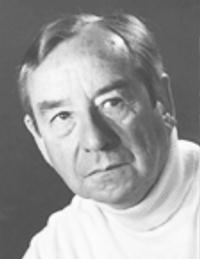Hofmann, Wolfgang
Biography
Born: September 06, 1922
Died: March 19, 2003
Country: Karlsruhe, Germany
Studies: Leipzig
Teachers:
The German violinist, composer and a conductor, Wolfgang Hofmann, was the son of the clarinettist Hermann Hofmann (b 1889 in Frankfurt/Main), who had once served as a solo clarinettist of the Gewandhausorchester Leipzig under Wilhelm Furtwängler. Wolfgang Hofmann grew up in Leipzig. He received his first piano lessons the age of 5 with his father. A year later he began taking violin lessons with Emil Kolb. At 11 he began studying composition with Hans Lindner. This period saw also the first composition exercises, but forbade his composition with the argument that he must dominate first the four-part harmony as well as J.S. Bach, before he could have a go at his own compositions, so that the father provided of new teachers. These were of exceptional quality: Rudolf Kempe (piano), at that time principal oboist with the Gewandhausorchester Leipzig, who prepared himself for his conducting career, Kurt Steadman (violin), then concertmaster of the Gewandhausorchester Leipzig, and later a professor in Munich, and Dr. Reinhard Oppel (music theory, music history).
Wolfgang Hofmann began appearing as a soloist already at a young age. At 17 he got a job as a violinist in the Gewandhausorchester Leipzig, which was then directed by Hermann Abendroth. However, in 1939 he was drafted for military service and had to interrupt his musical career for 8 years. During most of the war he was in a French prison camp at the edge of the Sahara. However, officers there detained had formed a camp university, where in addition to history, law, mathematics, science, architecture and linguistics, the prisoners could study music with Wolfgang Hofmann. Instruments were supplied by the Red Cross. Hofmann conducted a camp choir, founded a camp orchestra, made chamber music, gave violin and theory lessons and was active as a church musician for both denominations. He composed during this time a quintet for 2 violins, viola, flute and violoncello, 2 short operas and even a Catholic mass. All these works had their premieres in the prison camp. Only after the war and the return from captivity in 1948, he took posts as a violinist in the orchestras of Kaiserslautern and Darmstadt, and in 1955 as concertmaster at the Salzburg Mozarteum Orchestra. He was a member of the Mozarteum Quartet. With the Orchestra, the Mozarteum Quartet and as soloist in the following years he toured Europe, North America and Africa.
Based on his many years of experience Wolfgang Hofmann became an orchestra conductor in 1959. He was appointed Musical Director of the Kurpfälzischen Kammerorchester (Palatine Chamber Orchestra) in Mannheim, and led this orchestra for nearly 3 decades until October 1, 1987. During this time, Hofmann conquered the concert halls at home and abroad, and many German and foreign radio stations with programs that contained next to the famous chamber orchestra repertoire and beyond, also his own compositions. Besides his own compositions, Wolfgang Hofmann was intensely devoted to the excavation and performance of numerous works of Mannheim School. Thanks to him and the South German Radio in Heidelberg this wonderful music is heard again today. In 1968, after the death of Karl Ristenpart, Hofmann worked for several years with the Kammerorchester des Saarländischen Rundfunk, with which he has appeared often on television. In 1973 the Minister of Culture of Rhineland-Palatinate gave him the highest cultural award of the country, the Peter-Cornelius-Plakette. As a composer, Hofmann developed his own personal style, which "elevates the composition of the craft" (Hofmann in his book Goldener Schnitt und Komposition, Heinrichshofen-Verlag). He composed over 360 works: classical notation; style: bitonal, very rhythmical; for nearly all classical instruments and ensembles (solo - symphony orchestra).
From 1987 until his death in 2003 Wolfgang Hofmann worked as a freelance composer in Mannheim. On the occasion of his 75th Birthday, he published cheerful and critical reflections on the music of this century divertissement in his book. In 1992 Wolfgang Hofmann Stiftung (Foundation) was established for the promotion of young musicians at universities and music schools and competitions.[1]
Works for Percussion
Bolema für Bassklarinett und Schlagzeug - Marimba, Vibraphone; Bass Clarinet
Concerto für Schlagzeug und 14 Streicher - Multiple Percussion; String Orchestra - Arranged for Wind Ensemble
Duo für Klavier und Schlagzeug - Multiple Percussion; Piano
Duo für Kleine Trommel und Klavier - Snare Drum; Piano
Duo für Schlagzeug und Gitarre - Multiple Percussion; Guitar
Episoden - Percussion Sextet
Fünf Intermezzi für Marimbaphon und Blechbläserquintett - Marimba; Brass Quintet
Rondo für Marimbaphon - Marimba
Sonata piccola - Multiple Percussion; Flute
Telegramme für Schlagzeug - Multiple Percussion
References
